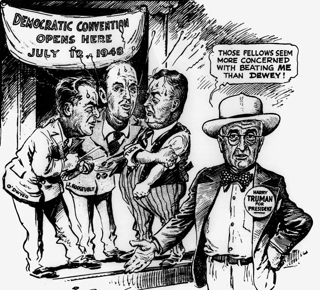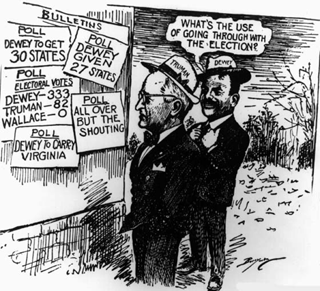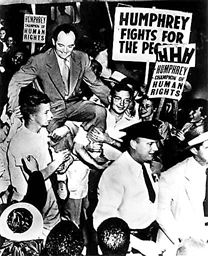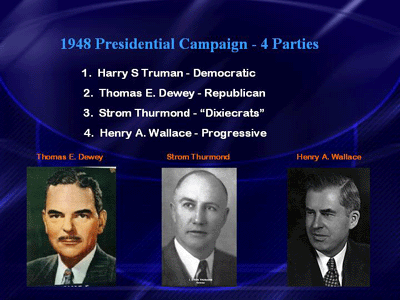
|
Could Truman Capture
Even His Own Party's Support?
Truman Library |
 Because
of the variety of errors that Harry Truman made in 1946 and 1947, many
critics—in fact most political pundits throughout the United States—were
saying as the 1948 presidential campaign loomed, Harry Truman didn't
have a chance. He might not even have a chance of getting the nomination
of his own party, let alone a chance of winning the presidency in his
own right. Well, it was true, there were many Democrats within the nation
and within Congress who did not want to see Harry Truman the Democratic
standard-bearer in the presidential campaign of 1948. Liberals, old
New Deal liberals, believed that Truman simply could not, in any effective
way, push Franklin Delano Roosevelt's New Deal policies. Conservative
Democrats were opposed to Harry Truman. Those in the middle believed
that whether that liked him or disliked him there was no way in hell
that this man was ever going to win the presidency in his own right.
And yet, at the Democratic National Convention in 1948, Democrats reluctantly
nominated him. Democrats finally came to believe that they could not
buck political tradition by refusing to give the nomination to the incumbent
President. Because
of the variety of errors that Harry Truman made in 1946 and 1947, many
critics—in fact most political pundits throughout the United States—were
saying as the 1948 presidential campaign loomed, Harry Truman didn't
have a chance. He might not even have a chance of getting the nomination
of his own party, let alone a chance of winning the presidency in his
own right. Well, it was true, there were many Democrats within the nation
and within Congress who did not want to see Harry Truman the Democratic
standard-bearer in the presidential campaign of 1948. Liberals, old
New Deal liberals, believed that Truman simply could not, in any effective
way, push Franklin Delano Roosevelt's New Deal policies. Conservative
Democrats were opposed to Harry Truman. Those in the middle believed
that whether that liked him or disliked him there was no way in hell
that this man was ever going to win the presidency in his own right.
And yet, at the Democratic National Convention in 1948, Democrats reluctantly
nominated him. Democrats finally came to believe that they could not
buck political tradition by refusing to give the nomination to the incumbent
President.
 |
The
Presidential Election Is A Foregone Conclusion
Truman Library |
A Four-Way
Race for the Presidency
The 1948 presidential campaign and election demonstrated that despite
all comments to the contrary, liberalism was not yet quite dead in America.
The election provided one of the classic upsets in all American political
history. Truman was expected to be soundly thrashed by his Republican
opponent, Thomas E. Dewey, the Governor of the state of New York.
The campaign was a four-way race, not just Democrat versus Republican.
One of two other new parties was the Progressive Party. Not our old
Progressive Party of Theodore Roosevelt or Robert La Follette, this
was a Progressive Party that had built itself during and immediately
after World War II by gathering together a host of people on the far
left of the political spectrum into a very loose coalition. It sought
nationalization of banks, socialization of much of the economy, and
had a good amount of support from the Communist Party of the United
States. The Progressive Party turned to Henry A. Wallace, FDR's
former vice-president, the man Truman had replaced, as their presidential
candidate. Listen to what Wallace had to say when he accepted the Progressive
Party nomination [voice of Wallace] .
In addition to
the Progressive Party, there was a party that called itself the States
Rights Democrats, or as it came to be known, the Dixiecrats,
whose candidate was the Democratic Senator from South Carolina, Strom
Thurmond. Southern Democrats had grown increasingly irritated with
Truman's stance on civil rights. In his memoirs Truman guessed that
earlier in life he had been a racist. Raised in Missouri, a state largely
settled by southerners, he had grown up learning that black Americans,
Jews, and Catholics were at best second-class citizens. But Truman showed
a remarkable capacity for growth, and during the late 30s and early
1940s began to see the social justice behind civil rights. In 1947,
even though he waffled a bit on the question, Truman nonetheless gave
a major speech revealing what he thought about the issue of civil rights.
Listen to an excerpt from that speech now [voice
of Harry Truman].
"Our immediate task is to remove the last remnants of the barriers which stand between millions of our citizens and their birthright. There is no justifiable reason for discrimination because of ancestry, or religion, or race, or color. Many of our people still suffer the indignity of insult, the harrying fear of intimidation and I regret to say, the threat of physical injury and mob violence. There is much that state and local governments can do in providing quality safeguards for civil rights. But we cannot any longer await the growth of a will to action in the slowest state of the most backward community. Our national government must show the way."

|
Minneapolis
Mayor Hubert Humphrey Returns Home From the Convention
AP Photo, Star Tribune |
At the 1948 Democratic National
Convention, a young political newcomer from the state of Minnesota, Hubert Humphrey, introduced a platform plank that committed the
Democratic Party to pursuit of civil rights for black Americans. Harry
Truman vigorously supported it. In horror and in anger Southern Democrats
rose from their seats, and walked out to form their own party. And so,
the Democratic Party was split three ways: Democrats for Truman, Democrats
for Wallace, Democrats for Thurmond. The opposition again was the Governor
of New York, Thomas E. Dewey, a dapper little man who dressed so well
that one critic said Dewy looked like he just had stepped off the top
of a wedding cake. All the political pollsters said Harry Truman did
not stand the chance of the proverbial snowball in hell. Truman nonetheless
campaigned quite vigorously. He ultimately traveled over 32,000 miles,
crisscrossing the United States in a train, walking out onto the back
platform at every whistle-stop, and giving speeches attacking the Republicans,
attacking the do-nothing Congress, and defending his record [voice
of Harry Truman].
"In our system the people have a right to know exactly what our two major parties stand for on specific issues. They have a right to know who is for them and who is against them. The decisive battle has arrived. The people are going to have to choose on side or the other. The Democratic Party and I have nothing to conceal. We are proud of our record."
 Despite
this vigorous campaign, on election eve no one gave Harry Truman a prayer
of winning the presidency, no one except—Harry Truman. As the early
election returns came in, Truman took the lead to the surprise of most
political observers. Yet, as the evening wore on, people went on national
television, people went on national radio, predicting that despite these
early returns, Dewey would win [voice predicting
Dewey victory]. One of the nation's great newspapers, the Chicago
Tribune, went ahead and printed its early morning edition in the
middle of the night, before the election returns were all in, with banner
headlines saying, DEWEY WINS! Next morning, when it became clear that
he hadn't, the Tribune had to recall thousands of copies of its
newspaper from the newsstands. Despite
this vigorous campaign, on election eve no one gave Harry Truman a prayer
of winning the presidency, no one except—Harry Truman. As the early
election returns came in, Truman took the lead to the surprise of most
political observers. Yet, as the evening wore on, people went on national
television, people went on national radio, predicting that despite these
early returns, Dewey would win [voice predicting
Dewey victory]. One of the nation's great newspapers, the Chicago
Tribune, went ahead and printed its early morning edition in the
middle of the night, before the election returns were all in, with banner
headlines saying, DEWEY WINS! Next morning, when it became clear that
he hadn't, the Tribune had to recall thousands of copies of its
newspaper from the newsstands.
|